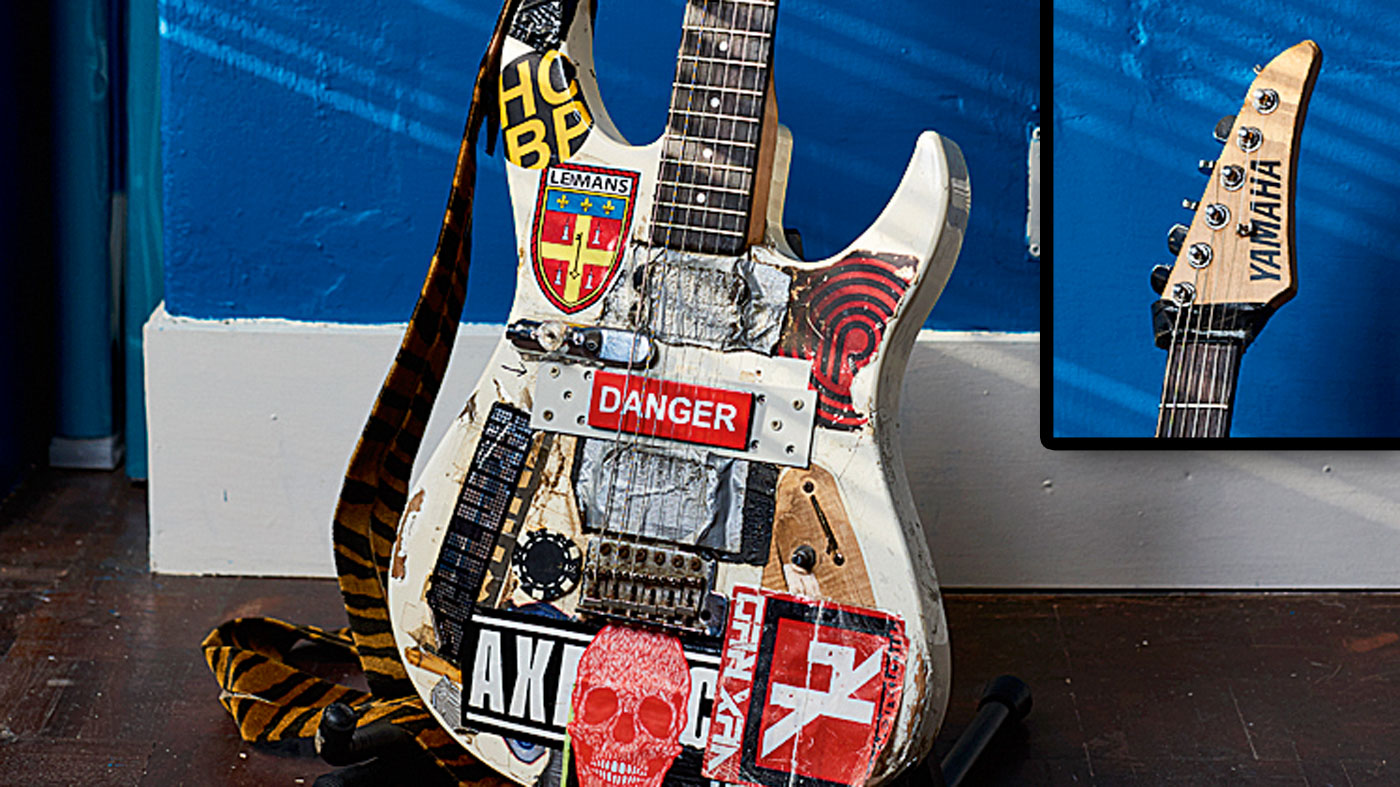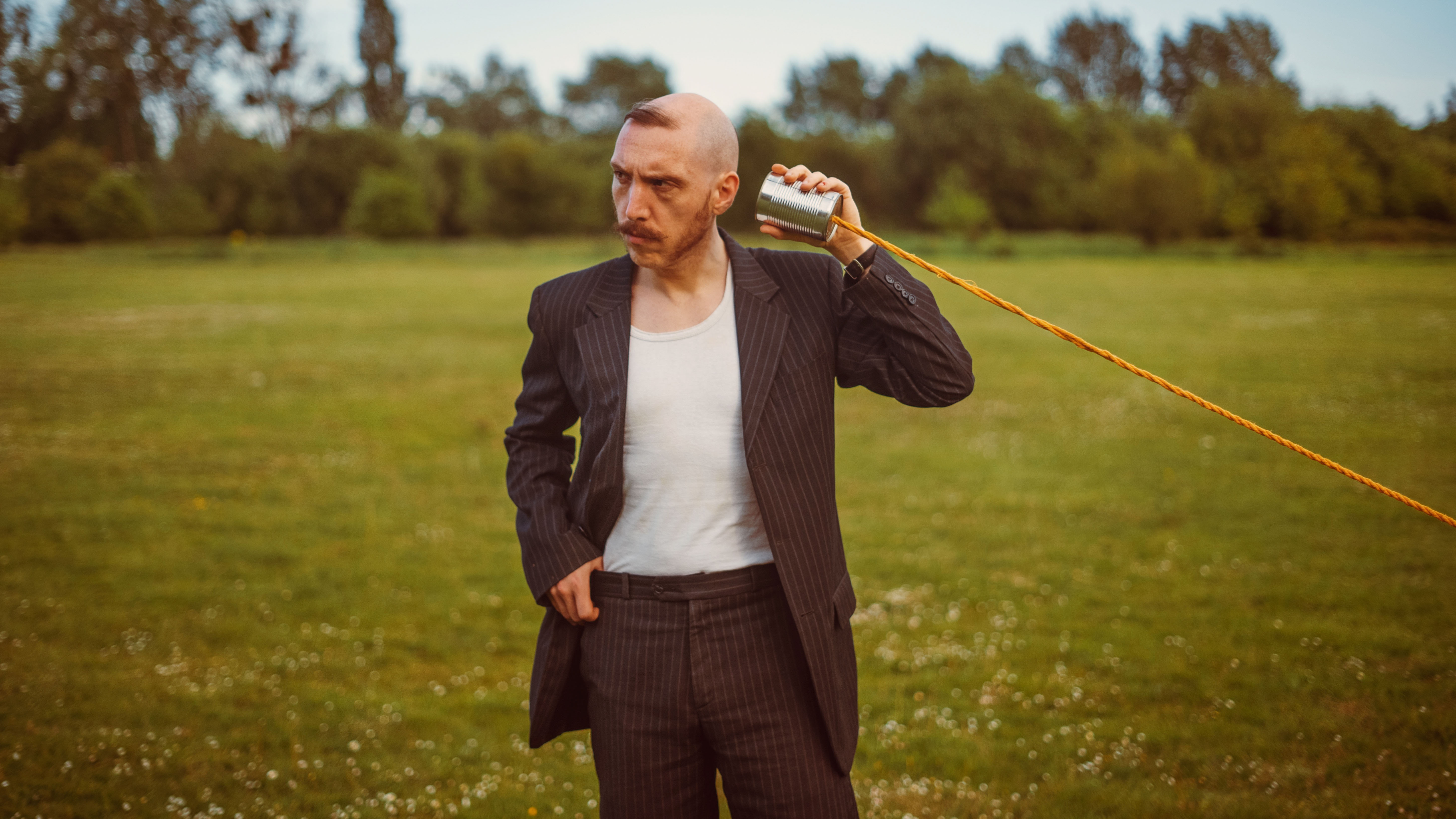
Want all the hottest music and gear news, reviews, deals, features and more, direct to your inbox? Sign up here.
You are now subscribed
Your newsletter sign-up was successful
"Here’s the thing – I really don’t think I’m all that unpredictable," says Jamie Lenman of his fascinating musical path so far. "As far as I’m concerned, I’ve been playing guitar music my whole life, and that’s never changed."
From juggernaut heavy to lullaby light, that much is true. His latest album The Atheist finds the UK maverick in melodic, upbeat territory with a wonderful showcase of his strengths as a songwriter in the classic sense. And as a musician; he played everything on the album.
"It was something I’d always wanted to do," Jamie tells MusicRadar about what prompted the move five albums into his solo career after previous band Reuben disbanded after three excellent records. "I’ve never been a particularly good drummer and I’m still not, but I’ve got better over the years and I enjoy it a lot so I thought it would be fun.
"I tried to suggest drumming on [2018 album] Devolver but my producer shouted me down, and he was probably right. I expect he didn’t want the job of fixing all my crummy fills, which eventually fell to [The Atheist producer] Mark Roberts – but actually, I don’t think it was any worse than any other session. God knows, we’ve all spent a week or two in drum world."
We've spoken to drumming guitarists in the past about how the two can influence writing approach, and were intrigued as to how it manifested on The Atheist. It turns how it's been doing so for years.
"I think when I was in [Reuben] it meant that all the guitar parts were very percussive," reflects Jamie. "Like the nu metal we touch on in the albums list [more on that later] and post-hardcore tends to be that way – everyone locks in and plays the same thing, for maximum effect. These days I like spreading out a bit more and having different parts go in different places… before they all lock back in for serious impact!"
Do you think playing the role of bassist can be beneficial for guitar players?
Want all the hottest music and gear news, reviews, deals, features and more, direct to your inbox? Sign up here.
"I’ve always loved playing bass, and in fact I played bass in Hundred Reasons for a run of gigs at the start of their career which was great fun. I don’t know about how beneficial it might be, but there’s something very satisfying about whacking on a bit of fuzz or even an octaver and just filling a room with sound – you can’t really do that with a six-string."
This album sounds really cohesive as well as life-affirming, but it was a surprise to hear some of the songs date back a while – is this an unusual record for you in that you looked into your song vault?
"No that’s every album I’ve ever made, with the possible exception of King Of Clubs, which sort of came from nowhere. But even that had a leftover from Devolver on it, and something from immediately afterwards, before Shuffle got in the way. That’s how I’ve always worked, nothing ever gets wasted. I file everything away until I find just the right place for it."
Do some of these songs date as far back as Reuben?
"It wasn’t that long ago! But sure, there’ve been Reuben songs on Muscle Memory and Devolver and now this one too. By which I mean – songs that I wrote whilst I was in Reuben, which amounts to the same thing.
"I don’t know if we ever played Deep Down together but I had a crummy demo of it that we would have listened to at some point, but as above, we just couldn’t find the right place for it – it was too poppy for us. I did that single too, Television Is Not Your Life, just last year - I wrote that before [Reuben's 2005 debut album] Racecar [Is Racecar Backwards] but I couldn’t get it off the ground somehow. It took twenty years to come out!"

Part of the point of The Atheist was to get away from my signature sound
Is your old Yamaha Pacifica you've had since those days still reporting for duty?
"I don’t take it out live any more because its neck is in about twenty separate pieces glued together and I just can’t get the sustain I need. But I will still take it to sessions and track with it – it’s got my signature sound.
"Saying that, part of the point of The Atheist was to get away from my signature sound, so I don’t think I played it at all on that one. I mostly played my new Revstar from the same company Yamaha, and the nice acoustic they gave me – plus a couple of Mark’s bits for particular textures. It’s all a big gumbo but the Yamahas are the base.
"Ibanez also gave me a lovely Talman bass that I used exclusively; big and beautiful and huge-sounding. I saw it in a guitar shop on the King Of Clubs tour and I wanted it bad, so I took a picture of myself with it like a kid nagging his parents in a toy shop and they sent me one the next day. How spoilt is that? They treat me like a little princess."

What has the experience been like playing with Jen Hingley from False Advertising as a second guitarist in the live lineup and did it affect your approach to parts for this record?
"It was the other way around – I wrote the record first, with all the jangly guitar parts and big solos, and then I realised I’d have to get another player to do it justice. But it’s fantastic having Jen on board – not just for the extra guitar, but for the vocals too.
"There’s some points in the set where Jacko’s [drummer Jack Wrench] using every limb in a different rhythm, I’m playing bass and guitar together, Jen’s ripping out a solo and we’re all doing three-way harmonies – it feels like an orchestra or something. It’s fantastic!"
Jamie Lenman is not unpredictable, then, but always interesting.
"Some of the records have faster or slower songs, some of them have longer or shorter songs, some of them have a big mix of everything," he reasons. "You get a different haircut or put on a new hat and everyone acts like you’re in disguise, it’s nuts.
"The one thing I can’t do is just write the same song again and again, like Oasis or Status Quo. But that’s what people expect from rock artists, which is maybe why some folks act surprised every time I make a new record. So to me, the differences are only very minor. Having said that, my next record is gonna FUCK YOU UP, so watch out."
But before that next interesting turn in the road, we wanted Jamie to catch a breath and look back on the key albums that have inspired him and it's quite a list…
Jamie Lenman: 10 albums that changed my life

1. Queen - Greatest Hits (1981)
For a long time I didn’t really regard greatest hits compilations as albums in their own right
"As anyone who’s ever met me will know, Bohemian Rhapsody (which I first heard round its 1992 re-release) was the song that convinced me I had to go into music. I found it on a bootleg copy of GH1, which is why I’m choosing that as the first record that changed my life - I’d enjoyed my parent’s Beatles tapes and they’re still my favourite band of all time, but they didn’t force that life change upon me; Queen did.
"As a record, it’s totally unimpeachable. Hit after hit after hit, utterly incredible. For a long time I didn’t really regard greatest hits compilations as albums in their own right, but now I can appreciate how a thoughtful track listing, combined with the sheer weight of ten or twenty years’ work, can produce something that no individual album can ever offer. Stunning."
2. Alanis Morissette – Jagged Little Pill (1995)
"These next two records go in the same little group for me, as I found them both at the same time. In fact, I was already weirdly familiar with all the tunes from Pill before they started playing them on the radio, and I couldn’t work it out until I remembered I’d been on holiday in Canada just before the whole thing blew up, and they must have been playing them in shops etc whilst I was visiting. So it sort of seeped into my consciousness, and I felt like I’d known it my whole life.
"You can just hear that virtuoso voice, that raw talent – it’s astounding. I used to try so hard to sing like she did, with the accent and everything, which was probably a mistake! Alanis talked about anger and sex and religion in a very honest way that was startling back in the mid-nineties. It was rocking but it also had huge melodies – always a killer combo!"
Garbage – Garbage (1995)

"Every band is going for that thing where they act like they don’t give a damn, but Garbage (and especially Shirley Manson in those first couple of years) looked and sounded as if they’d rather you died, which was weirdly appealing.
"The textures on that record are really aggressive – everything is these grungy loops and fuzzed up bass guitars, really messy and industrial and when you listen to it you wonder how they got it past so many people.
"It doesn’t sound anything like Nevermind, which again I adored but it didn’t really have the same impact on me as it might have done if I’d heard it a little earlier. I was too young for the first wave of grunge, but I was right on time for Garbage and they hit me in that sweet spot. It came right at the end of my childhood, and in fact I’d just sold all my old toys at a big car boot sale and I spent all the money on a tape of this record, so that was quite a symbolic exchange in retrospect. Meant to be!"
Coal Chamber – Coal Chamber (1997)
"Look, this isn’t my list of 'top 10 best albums', right? It’s the list of 10 albums that changed my life, and this one did. Coal Chamber were right there at the start of nu metal which, for better or worse, was the scene I came up into as a teenager, so we didn’t realise at the time they were a bit of a joke.
Say what you like about nu metal, it’s a unique and completely original sound
"Oddly I didn’t get into Korn until a little later, which meant it was Coal Chamber who introduced me to the idea of scream-singing, plus all the down-tuned guitars and the very percussive rhythm sections – say what you like about nu metal, it’s a unique and completely original sound.
"I listened to this not long ago, expecting to curl up into a ball and die from embarrassment, but actually it still totally slams – just brutal. Some of the lyrics are maybe a bit wonky, but then so are some of mine – whaddyagonnado?"
Tool – Ænima (1996)
I loved the way Maynard’s vocals were low in the mix, so he wasn’t the star – they were all the star -they still are!
"When I first heard Stinkfist I just did not get it – it didn’t even sound like music to me, it sounded like a bunch of random noises. That’s how unschooled I was, how entrenched I was in certain structures and formats. Nowadays I can hear that it’s actually one of Tool’s poppier tunes, and it seems tame by comparison, but I can still remember how confused I was. Gradually it got its hooks in me and after a little while I was practically living inside that album – listening to it every day. I even printed out the lyrics and carried them around with me.
"This was the first record that introduced to me the idea of long songs with loads of sections that didn’t have to repeat – or do anything conventionally (I realise Bo Rap is long too, but it’s a bit more like a mini-suite of lots of little songs rather than a prog epic.) I loved the way Maynard’s vocals were low in the mix, so he wasn’t the star – they were all the star -they still are! I thought Lateralus sounded like warmed-through leftovers after this, going through the motions a bit. Fight me!"
Nine Inch Nails – The Fragile (1999)
Here was an industrial album with disco beats, soundscapes, a quarter of it is instrumental, it’s crazy
"This list just reads like I was always a little late to the party and caught on just after the big event, like with Nirvana, and actually The Downward Spiral didn’t connect with me until a lot later. The Fragile, on the other hand, just blew my mind apart. It was like nothing I’d ever heard before – even the instrumentation, all the ukulele or mandolin or whatever it was, sounded weird and alien.
"Here was an industrial album with disco beats, soundscapes, a quarter of it is instrumental, it’s crazy. Even the artwork was iconoclastic – rock bands wear black, their album covers are black, but here’s these sort of blissed-out collages of flowers against white, all pixelated and unreal, it was amazing.
"A while ago I got together with my buddy Ric, who put out the first ever Reuben record, and Mark who drummed on it, and listened to the whole thing non-stop on Mark’s new super stereo. We turned the lights down and ate a giant pizza, it was spectacular.
"I find it funny how these huge alternative bands like Deftones and Marilyn Manson and Nine Inch Nails all had these massive hits with very aggressive sophomore albums, and then when they finally have the money and the time and the space, they all go away and make these really reflective followups. I’ll bet their labels were furious!"
At The Drive In – Relationship of Command (2000)
"Here’s where I started to catch up with things – I was right on time for this one. By this time I was playing with my band and we were doing a lot of Nirvana-type stuff, basic grunge pop songs, and then ATDI exploded and everything got really complex all of a sudden!
"I mean, the last two albums I’ve spoken about were very complex, and since I’d heard them I adored that kind of music, but there was something about them that was ‘other’ in some way – like you could never be Tool or Nine Inch Nails. But somehow ATDI had made this raw, combustible record that sounded like it was going to come off the rails at any second, and it sounded like something we could actually play. So we tried our very best, and the results were variable! You can hear it on things like Fall Of The Bastille or Wooden Boy on those early Reuben records.
With Relationship, you have five guys each doing something completely different to each other on every track, winding all over the place, and STILL the songs stay in your head
"If you listen to an album like Weezer’s debut or even Kerbdog’s On the Turn (both of which would be in my ‘best of’, if that was what this article was asking), you can hear that these are great songs, very strong, and everything that’s being played is in the service of the song. That’s what my new album is about. But with Relationship, you have five guys each doing something completely different to each other on every track, winding all over the place, and STILL the songs stay in your head. I can’t work out how they do it. And can you believe they hate this record? Some people, eh…"
Refused – The Shape of Punk To Come (1998)
"This is one that I heard when it came out but I wasn’t ready for it – I remember Paul [Townsend] from Hundred Reasons playing it to me in his bedroom and it was just too wild for me to process. Funnily enough, I reconnected with it at the after-party for their first album release (it must have been Paul who put it on the playlist) and suddenly it all made sense.
"They’ve got all these sharp angles but then these huge riffs and they sound so angry you can’t believe it – they’re using the concept of an album as a political instrument in a way that I don’t think anyone has done before or since.
"They play like virtuosos but again in a sort of attainable way – each track has about a million ideas thrown into it, a little like the ATDI record, and in fact maybe it was Relationship that softened me up until I was in a place where I was ready to receive Shape. Plus, the title of the record is a prediction that actually came TRUE – people are still trying copy this record and no one comes close. How awesome is that?"
Strapping Young Lad – City (1997)
"This is another record that I just could not compute at the time I heard it. It was the fastest, heaviest thing I’d ever heard and actually it still might be. The production is so tinny, it wasn’t at all like the muddy nu metal stuff that was out at the time, and Devin’s vocals are so low in the mix they could almost be another guitar or something. It was totally at odds with everything I’d ever known, and that made it dangerously attractive.
"I remember buying it from my local record store, still unsure that I liked it, but knowing it was probably good for me, like vegetables or exercise. I forced myself to listen to it, and then suddenly by the end of All Hail The New Flesh I realised to my surprise that I was actually praying it would never end – that this song would just go on forever.
I used to carry the CD in my pocket wherever I went so I could make sure that I’d always be able to listen to it
"I used to carry the CD in my pocket wherever I went so I could make sure that I’d always be able to listen to it – as soon as I’d get to school or someone’s house or whatever I’d stick it on the stereo and just blast it. I wasn’t always too popular! Later on I got a mini-disc player and I would plug in and listen to it, even when I was in a crowd of friends hanging out or whatever. Perhaps it was rude of me - I think it pissed some of them off, but I just couldn’t live without it – I was addicted. Crazy!"
CW Stoneking – Jungle Blues (2009)
After my band broke up I went a bit insane and became obsessed with the late nineteenth/early twentieth century
"This isn’t even a rock album, but I’m putting it in here cos it changed my life completely – or rather, it coincided with a big change in my life and cemented that period for me.
"After my band broke up I went a bit insane and became obsessed with the late nineteenth/early twentieth century, which had always been an era of interest, but suddenly it was my whole life. I grew a moustache, started wearing woollen suits and listened to a lot of pre-war jazz. Stoneking was right there in the middle of it with this record, and I went to see him on his UK tour having only heard one song.
"There’s an honesty to the whole thing, recorded with just one microphone and a few players, and an atmosphere so thick you could cut it with a wooden spoon. I lost myself in banjos and trumpets and hoodoo for a good few years until I was able to climb out, but I very much enjoyed my stay.
"That was the last record that truly changed my life, about ten years ago. I’ve heard a lot of great stuff since, but nothing that has made that kind of impact – although there have been a few close calls and I’m still hopeful of having my world turned upside down again!"
- The Atheist is released on 25 November. All the proceeds of latest single Hospital Tree will go to NHS charities. For more info visit jamielenman.com

Rob is the Reviews Editor for GuitarWorld.com and MusicRadar guitars, so spends most of his waking hours (and beyond) thinking about and trying the latest gear while making sure our reviews team is giving you thorough and honest tests of it. He's worked for guitar mags and sites as a writer and editor for nearly 20 years but still winces at the thought of restringing anything with a Floyd Rose.